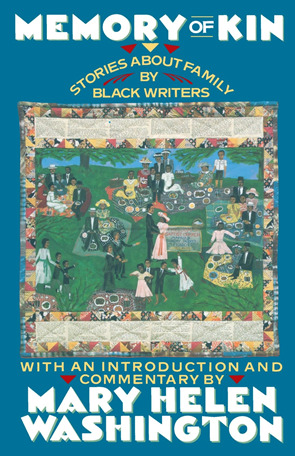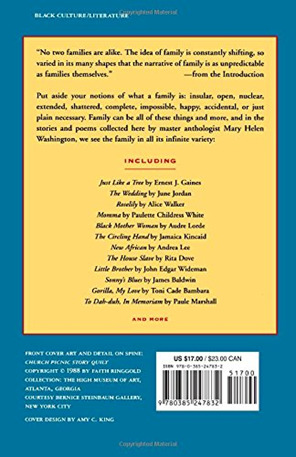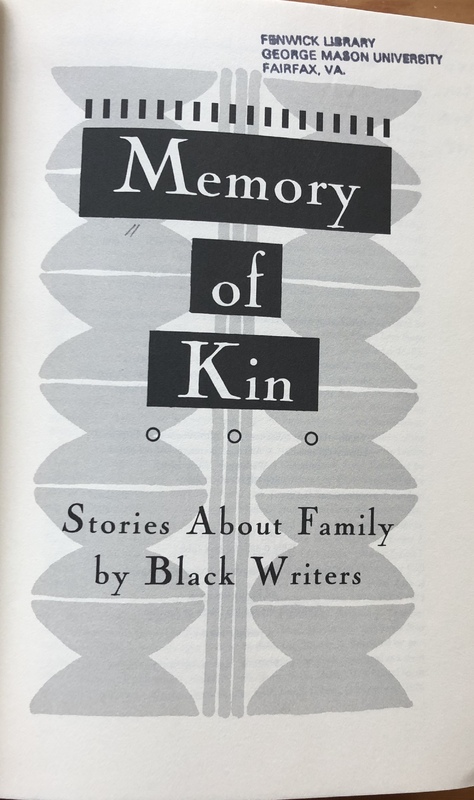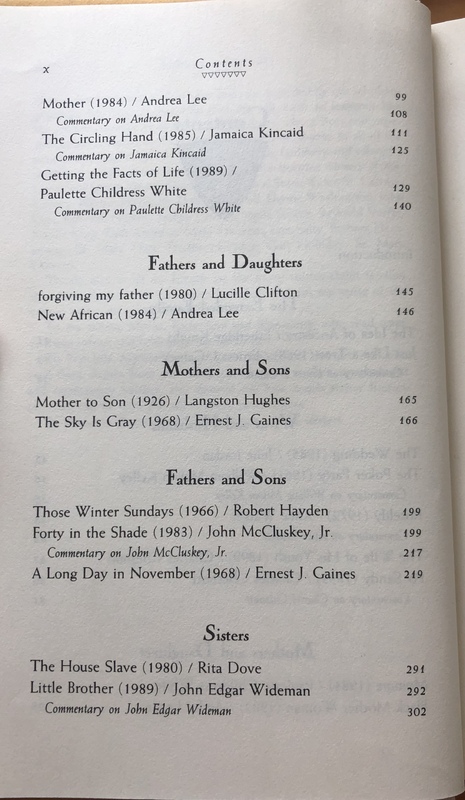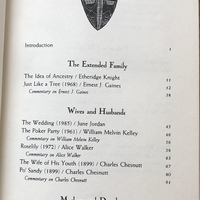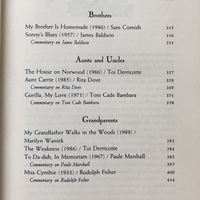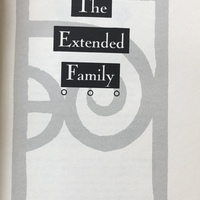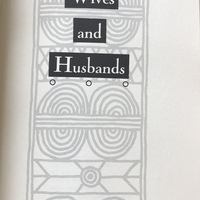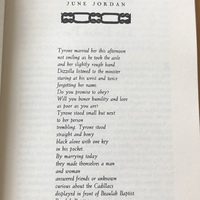Memory of Kin: Stories about Family by Black Writers
Item
-
Title
-
Memory of Kin: Stories about Family by Black Writers
-
This edition
-
"Memory of Kin: Stories about Family by Black Writers" . Ed. Mary Helen Washington. New York: Doubleday, 1991. xi+416 pp.
-
Table of contents
-
● Mary Helen Washington / Introduction
The Extended Family
● Etheridge Knight / The Idea of Ancestry [poem]
● Ernest J. Gaines / Just like a Tree (1968)
● Mary Helen Washington / Commentary on Ernest J. Gaines
Wives and Husbands
● June Jordan / The Wedding (1985) [poem]
● William Melvin Kelley / The Poker Party (1961)
● Mary Helen Washington / Commentary on William Melvin Kelley
● Alice Walker / Roselily (1972)
● Mary Helen Washington / Commentary on Alice Walker
● Charles Chesnutt / The Wife of His Youth (1899)
● Charles Chesnutt / Po’ Sandy (1899)
● Mary Helen Washington / Commentary on Charles Chesnutt
Mothers and Daughters
● Paulette Childress White / Momma (1984) [poem]
● Audre Lorde / Black Mother Woman (1982) [poem]
● Andrea Lee / Mother (1984)
● Mary Helen Washington / Commentary on Andrea Lee
● Jamaica Kincaid / The Circling Hand (1985)
● Mary Helen Washington / Commentary on Jamaica Kincaid
● Paulette Childress White / Getting the Facts of Life (1989)
● Mary Helen Washington / Commentary on Paulette Childress White
Fathers and Daughters
● Lucille Clifton / forgiving my father (1980) [poem]
● Andrea Lee / New African (1984)
Mothers and Sons
● Langston Hughes / Mother to Son (1926) [poem]
● Ernest J. Gaines / The Sky Is Gray (1968)
Fathers and Sons
● Robert Hayden / Those Winter Sundays (1966) [poem]
● John McCluskey Jr. / Forty in the Shade (1983)
● Mary Helen Washington / Commentary on John McCluskey Jr.
● Ernest J. Gaines / A Long Day in November (1968)
Sisters
● Rita Dove / The House Slave (1980) [poem]
● John Edgar Wideman / Little Brother (1989)
● Mary Helen Washington / Commentary on John Edgar Wideman
● Alexis De Veaux / Adventures of the Dread Sisters (1989)
● Mary Helen Washington / Commentary on Alexis De Veaux
Brothers
● Sam Cornish / My Brother Is Homemade (1986) [poem]
● James Baldwin / Sonny’s Blues (1957)
● Mary Helen Washington / Commentary on James Baldwin
Aunts and Uncles
● Toi Derricotte / The House on Norwood (1986) [poem]
● Rita Dove / Aunt Carrie (1985)
● Mary Helen Washington / Commentary on Rita Dove
● Toni Cade Bambara / Gorilla, My Love (1971)
● Mary Helen Washington / Commentary on Toni Cade Bambara
Grandparents
● Marilyn Waniek / My Grandfather Walks in the Woods (1989) [poem]
● Toi Derricotte / The Weakness (1986) [poem]
● Paule Marshall / To Da-duh, In Memorium (1967)
● Mary Helen Washington / Commentary on Paule Marshall
● Rudolph Fisher / Miss Cynthie (1933)
● Mary Helen Washington / Commentary on Rudolph Fisher
-
About the anthology
-
● The anthology consists of twelve poems and nineteen stories, along with critical commentary by the editor on each of the story writers.
-
Anthology editor(s)' discourse
-
• In her introduction, Mary Helen Washington suggests that families are like minefields ("we walk and dance through them never knowing where or when something or someone is going to explode"), but also that they are "a living mystery, constantly changing, providing us with clues about who we are, and demanding that we recognize the new and challenging shapes it often takes" (1). Speaking personally, Washington writes: "While I am still resistant to the claims of family, I find myself, after reading these stories and poems, more open to that mysterious process called family, more aware of how it enriches and enlarges my sense of self and less inclined to see myself merely as a survivor, carefully stepping around mines" (2).
-
• Washington tells us that "one of the main aims of this collection" is "to make it difficult for . . . readers to fall back on conventional notions of family, especially of the black family. I wanted readers to question and to discard sentimental clichés about the family as a unit of supreme unselfishness and total support, a rock and a shelter on which we can always depend in hard times. I wanted stories that would shatter notions of an ideal family or myths that deny the complexities of family life . . . I wanted the mystery of family to be enacted in the number and variety of stories in this collection. In nineteen stories and twelve poems, no two families are alike" (2).
-
• Washington notes that although the number of men and women authors included in the anthology is deliberately almost equal, the contents of the stories tend to be women-centered: "When I began selecting stories for this collection, I was determined that this book present men and women writers equally. There are seven male writers and eight female writers, with ten stories by men and nine by women. No matter how hard I tried to create this egalitarian model, this collection resisted the gender symmetry I was imposing. In many ways this is a woman-centered book, and that is because the family has been the central concern of women. Women have been the caretakers in families, and that caretaking extends even to the stories of family history. Women characters pass down family stories--even in the fiction written by men . . . In seventeen of the nineteen stories, women are major characters, central to these family stories just as they are to the rituals of family life" (4).
-
• "As this project got underway, I began to be more and more uneasy about constructing a text around the theme of family even though women are so prominently and powerfully represented in these stories. I know how the idea of family has been used to oppress women, especially black women. Fundamentalists can conjure up so-called 'family values' whenever they want to assert male domination and canonize female subordination. Almost every effort on the part of women to achieve equality in society has been associated with the loss of these so-called 'family values.' So a book that takes family as its major subject needs to be aware of the ideological traps that underlie the construction of family" (4-5).
-
• Washington remarks that "In each of the essays that follow the stories, I have tried to suggest readings that do not assume a one-to-one correspondence with 'real life' as though these stories were merely transparencies for us to look through and see 'real-life families' on the other side" (5). "In all of these stories," Washington adds, "race is the text within the text, another story which also must be read and deciphered" (6).
-
• Families are lived realities, but they are also artifacts of memory and recollection: "much of what we call family is constructed through memory--what we remember and pass on becomes an essential part of family. In a sense all of these stories about family are also about loss and about the effort to retrieve something through art. Sometimes written from the viewpoint of the writer who has moved away from home and family, they are the writer's way to erase that distance and diminish loss. I am thinking specifically of James Baldwin writing from France about his family in Harlem or Ernest Gaines writing about rural Louisiana from an apartment in San Francisco, or Alice Walker writing from the California mountains about rural Georgia. I think of my own family at our last gathering, sitting around a table with a plastic-lined bushel basket in which we keep hundreds of old photographs, some from as far back as the 1880s, and saying as we pick up each picture, 'Remember this.' We look at these photographs of ourselves as children in the various rituals of growing up and being grown and we try to re-create the meaning(s) inscribed in those pictures. Like the twenty-four storytellers in this collection, we too become artists, re-creating our family in an imaginative act, retrieving what is lost by reconstructing our own 'memory of kin'" (7-8).
-
Reviews and notices of anthology
-
• Berry, Karin D. "Stories of Black Family Life, Without Clichés." "Baltimore Sun" 17 March 1991.
-
• Bray, Rosemary L. "In Short: Fiction." "New York Times" 20 Jan. 1991.
"In her introduction to this sparkling collection of 19 stories and 12 poems by African-American authors, Mary Helen Washington writes that she was motivated to explore the family "as a living mystery." In fact Ms. Washington -- a visiting [sic] professor of English at the University of Maryland, College Park -- succeeds in re-creating here the many facets of that mystery. These collected works evoke all the love, anger, frustration and sacrifice that such memories are made of. Many works will be familiar to admirers of the literature: Robert Hayden's exquisite poem "Those Winter Sundays" delineates a father's grim love; Toni Cade Bambara's story "Gorilla, My Love" recounts a young girl's reluctant movement toward womanhood. But even those who have never read Alice Walker or Ernest J. Gaines will find themselves in good hands. Ms. Washington's insightful critical commentary follows each section, providing a very modern look at one of the world's oldest social structures."
-
New York Times
-
• Golden, Marita. "Dispatches from the Home Front." "Washington Post" 23 Dec. 1990.
"A prodigious editor of seminal anthologies, reviewer, lecturer, professor and critic, Washington has focused much of her most important work on unearthing the often ignored, erased or forgotten literary legacy of significant black women writers past and present. In the anthologies Black Eyed Susans and Midnight Birds: Stories By and About Black Women, and most recently in Invented Lives: Narratives of Black Women 1860-1960, Washington presents and evaluates the rich chorus that black women writers have constructed for the telling of tales that too often no one wanted to hear."
"Apart from its literary value, much of the importance of this book springs from the enduring fascination of sociologists, educators, journalists and "experts" with the black family. Perhaps no other people in America have had more written by more people who knew so little about their families than have African-Americans. In Memory of Kin the foibles, failures and strengths of the black family are rendered by the real experts -- people who happen to be writers whose voice and vision sprang from those families."
"Poetry opens each section of the book and each story is followed by a critical evaluation by Washington in which she discusses the story's themes, arguing with and even dissenting from the thrust of some stories."
"Memory of Kin opens up, stirs up, reveals, questions the nature of love, loyalty and family. This is a book not only for the classroom but for the dining room and the bedroom as well -- where families most often explode, make peace and survive."
-
Washinton Post
-
• Peters, Pearlie Fisher. Review of "Memory of Kin." "Atlanta" 7.2 (Fall 1990): 74.
-
• "Publishers' Weekly" 1 Dec. 1990. Web.
"Organized under 10 familial categories--from wives and husbands to mothers and sons to the extended family--this potpourri of stories, excerpts from novels, and poems explores the many ways the generations connect. The standout is James Baldwin's sensitive, intense tale of a young man's struggle with drugs and despair, and the healing power of art in Harlem in the 1950s. . . . Replete with vivid narratives and illuminating insights, this is an engrossing collection."
-
Publishers' Weekly
-
See also
-
• Other anthologies edited by Mary Helen Washington:
-
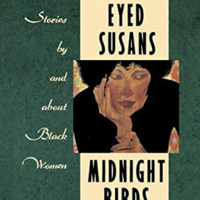 Black-Eyed Susans [and] Midnight Birds: Stories by and about Black Women
Black-Eyed Susans [and] Midnight Birds: Stories by and about Black Women
-
 Invented Lives: Narratives of Black Women, 1860-1960
Invented Lives: Narratives of Black Women, 1860-1960
-
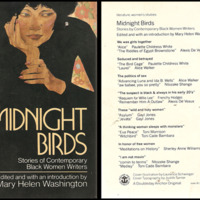 Midnight Birds: Stories by Contemporary Black Women Writers
Midnight Birds: Stories by Contemporary Black Women Writers
-
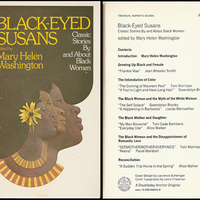 Black-Eyed Susans: Classic Stories by and about Black Women
Black-Eyed Susans: Classic Stories by and about Black Women
-
• "Black Women's Writing Recovered: An Interview with Mary Helen Washington." Marxists.org Jan. 2016.
"The stories in my fourth anthology, Memory of Kin: Stories About Family by Black Writers (1991), were intended to go beyond the individual and consider these subjects part of a family and of a community, to rethink Black family as “living mystery, constantly changing, constantly providing us clues about who we are.” The cover features Faith Ringgold’s 1988 Church Picnic Story Quilt, the focus on quilts suggesting the search for new artistic models and the renewed appreciation of African American folk culture."
-
Marxists.org
-
• Greene, Brenda. Interview with Mary Helen Washington. "Writers on Writing" Radio Show. WNYE 91.5 fm. 18 April 2021 [YouTube 32 min 18 sec]; re-broadcast 25 April 2021.
"Dr. Brenda Greene interviews African American literary scholar Dr. Mary Helen Washington. This interview continues the discussion on Paule Marshall at the 2021 National Black Writers Biennial Symposium hosted by the Center for Black Literature at Medgar Evers College, CUNY. Greene and Washington discuss the value and importance of documenting the work of Black women writers, the themes in the texts of Black women writers, and Washington’s edited collections of scholarship on Black women writers. Washington also discusses her current project, a biography of Paule Marshall, Marshall’s activism and the significance of her novels and short stories on the Western canon. Washington highlights the young scholars who are expanding the field of African American literary criticism and encourages young scholars to become involved in saying the names of unsung Black women writers and conducting research on their work."
-
Writers on Writing
-
YouTube
-
Cited in
-
Kinnamon 1997: 473]
-
Item Number
-
A0259
 Black-Eyed Susans [and] Midnight Birds: Stories by and about Black Women
Black-Eyed Susans [and] Midnight Birds: Stories by and about Black Women
 Invented Lives: Narratives of Black Women, 1860-1960
Invented Lives: Narratives of Black Women, 1860-1960
 Midnight Birds: Stories by Contemporary Black Women Writers
Midnight Birds: Stories by Contemporary Black Women Writers
 Black-Eyed Susans: Classic Stories by and about Black Women
Black-Eyed Susans: Classic Stories by and about Black Women
